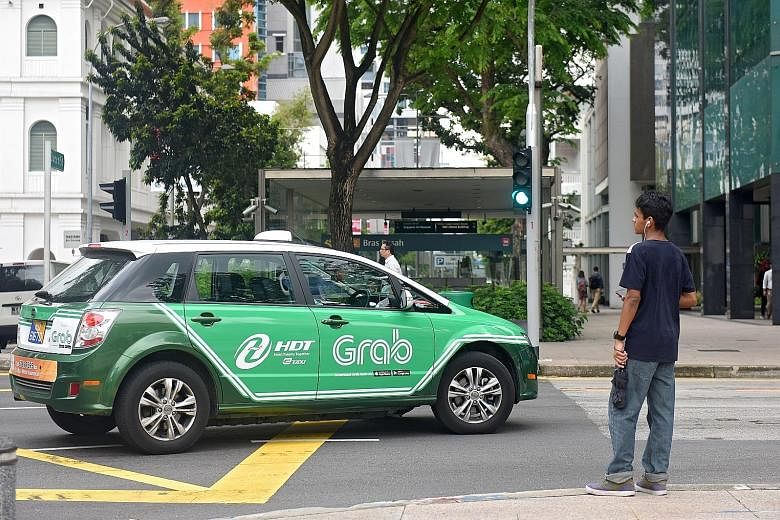With the Vietnamese New Year, Tet, around the corner, Ms Vuong Thi Minh Thu logs on to her Facebook account and uploads tantalising shots of gio thu, a rich, crunchy sausage made with parts of a pig's head.
"My mum's gio thu is wrapped with dong leaves grown in our backyard, fastened by bamboo strips. They look very retro and adorable... Price 250,000 dong (S$14.50) per kg," she writes.
When orders are placed, the 33-year-old advertising company director delivers them around Ho Chi Minh City on her motorcycle. Apart from gio thu, she also sells other local specialities like banana and coconut candy and shrimp sauce as a sideline.
"When I want to attract more customers for my seasonal products, I will pay for a Facebook advertisement," she tells The Straits Times.
Transactions like hers are coming under scrutiny from taxmen around South-east Asia as rising numbers of people go online to buy goods and services.
A recent Credit Suisse report launched last month predicted that the growth of electronic retailing in Asean will outpace that of offline sales by six to 10 times over the next few years. The Internet economy's share of South-east Asia's gross domestic product is expected to grow from 2 per cent last year to 6 per cent - or US$200 billion (S$263.9 billion) - in 2025, according to a study by Google and Temasek.
Tax authorities in Thailand, Vietnam, Indonesia, Malaysia and Singapore are mulling over legal changes to let them capture online transactions that range from sales over social networking platforms to advertisements on Facebook and Google pages to car journeys that are booked and paid for via ride-hailing applications. At the heart of discussions is how corporate income tax, personal income tax and value added tax (VAT) should be levied on sales that are typically conducted on platforms or by firms based offshore.
-
Taxing e-commerce in region
-
INDONESIA
When: Government aims to issue rules by middle of this year. Proposals:
• Ride-hailing firms to be locally incorporated and subject to existing corporate income tax.
• Duty on imported digital items like e-books.
THAILAND
When: Public hearing until Friday for the second draft of proposed legislative amendments. Proposals:
• Foreign firm providing services through electronic media may be subject to value added tax if services are consumed in Thailand and income earned from those services exceeds 1.8 million baht (S$75,400).
• Entities will have to pay income tax if they have created a Thai Internet domain, created a payment system in baht or require money transfer from Thailand.
MALAYSIA
When: Legal amendment has not been tabled. Proposals:
• Goods and Services Tax Act to be amended to cover foreign sellers or foreign e-commerce operators.
VIETNAM
When: Draft law expected to be sent to the National Assembly next year. Proposals:
• Cross-border payments to be made through domestic gateways via the National Payment Corporation of Vietnam.
• Foreign e-commerce firms must have local representative office.
• Individuals retailing on electronic platforms to be scrutinised.
PHILIPPINES
When: Taxes on online transactions since 2016. Provisions:
• 12 per cent value added tax on online sales worth more than 1.92 million pesos (S$49,000) a year.
• Transactions amounting to less than the threshold are taxed at 3 per cent of monthly revenue.
• Personal income and other sales taxes apply.
• Enforcement has proven difficult.
MAKING OFFSHORE FIRMS PAY
While officials in the region want online technology giants to pay their fair share of tax, they are trying to do so without snuffing out future growth.
Thailand's Revenue Department is now holding a public hearing on a set of proposals relating to online transactions. If the proposals go through, a foreign company based overseas providing services that are used in Thailand would have to pay VAT - currently set at 7 per cent - if the income it gets from providing these services exceeds 1.8 million baht (S$75,120) a year.
In Malaysia, the government announced last September that the Customs Department was in talks with the finance ministry to impose the 6 per cent goods and services Tax (GST) on foreign e-commerce providers. Second Finance Minister Johari Abdul Ghani told reporters last month that it was consulting the Organisation for Economic Cooperation and Development (OECD) on this matter.
Indonesian Transport Minster Budi Karya Sumadi has said that ride-hailing apps like Uber would be subject to the existing corporate income tax - currently set at 25 per cent - in regulations expected to be finalised in six months' time.
"We will require them to be locally incorporated and therefore they are subject to the existing corporate income tax," he told The Straits Times.
Last November, Vietnam's government released a proposal for all cross-border payments to be made through domestic gateways via the National Payment Corporation of Vietnam. The move would allow for closer tracking of tax liabilities. According to the accounting firm KPMG, the final version of the law is expected to surface some time next year.
But, even as the new rules are being drafted, the authorities are combing through the financial records of e-commerce giants. The Ho Chi Minh City tax department late last year faced off with ride-hailing firm Uber over 53 billion dong in unpaid taxes, an amount the company disputed. The tax department asked local banks to redirect to it fares that were paid to Uber. Uber sued the department, only to see the case dismissed in court.
Such a tough stance against online firms is being replicated across the world. The European Commission, for example, is looking into amending tax rules to get a greater share of profits of such firms. After a report published by the commission in September revealed that digital companies paid less than half the tax of traditional companies, France mooted the idea of taxing these firms on their revenue instead of profit.
Facebook channels advertising sales generated outside the United States through its international headquarters in low-tax Ireland. From January to September last year, it recorded US$27.2 billion in advertising revenue - 17 per cent of which was derived from the Asia-Pacific. Under pressure to be more transparent, it announced in December that it would start logging revenue locally instead of routing it through Dublin.
Facebook declined to comment when asked by The Straits Times when and where such changes would take place in South-east Asia.
But Mr Jeff Paine, the managing director of Asia Internet Coalition, an industry association which has Google, Facebook and Twitter among its members, wrote in an e-mail: "Most governments realise that offering favourable tax environments to attract foreign businesses or to encourage local entrepreneurs to stay is good for their economy, which is why they do it. Internet companies can't and shouldn't be blamed for taking advantage of those incentives, which in turn boosts global commerce and allows local economies to thrive."
Not all technology companies, however, have offshore structures. Ride-hailing company Grab registers as a local entity in each country that it operates. "Grab has structured its business to be GST/VAT-compliant and does not channel revenue offshore in an attempt to exploit tax loopholes," its spokesman said in response to queries.
"Contributing to our host countries' economies and paying our fair share in order to support nation-building efforts are part of our core values," the spokesman added.
SMALL FIRMS IN CROSSHAIRS
Smaller local operators are also being targeted by the taxmen across the region. In Vietnam, the authorities say they have identified some 13,000 Ho Chi Minh City-based users advertising and selling items on Facebook as at end-September. But tracing transactions is a formidable task.
"Online trading and retailing are very popular in Vietnam but they often use cash payment," Mr Nguyen Nam Binh, deputy director of Ho Chi Minh City's tax department, told The Straits Times. "Some shops use banking transfers but they use the accounts that are not registered with the Department of Taxation. Many shops do not register their companies or trading activities with the authorities and they do not declare and pay tax at all."
Enforcement is similarly a problem in the Philippines, where 12 per cent VAT has been levied on online sales worth more than 1.92 million pesos ($49,000) since 2016. Sales amounting to less than that threshold is taxed at 3 per cent. While movie-streaming site Netflix includes VAT in its subscription packages in the country , many others profiting from advertisements on their websites do not pay taxes. Regulators can compel Internet service providers to shut down these sites, but firms simply change or mask their Web addresses.
Small-time traders like Ms Geraldine Kay Rodriguez, 47, have argued that they are part of the "informal sector" and therefore need not pay tax. She used to sell perfumes, clothes, baby items and chocolates online, making just 7,000 pesos in sales on her best week. Taxes "will just kill the industry that thrives on the buy-anything-from-home experience," she said.
But not everyone agrees. Online retailers interviewed were sceptical that the taxmen would be able to keep up with entrepreneurs hawking items on social media networks or popular online marketplaces like Lazada and Tokopedia.
Chiang Mai-based online skincare product retailer Onampai O-Siri, who chalks up about 50,000 baht (S$2,100) in sales every month, said: "I will be willing to pay tax, but I wonder how the government will trace every single vendor.
She claimed the big vendors who make more than 1.8 million baht in sales every year are evading VAT by selling through multiple user accounts.
Both big and small online businesses are also worried about the amount of paperwork that new tax regulations may bring, given that the very appeal of Internet-based transactions lies in its speed and simplicity.
Tax consultants said firms are actually more concerned about the administrative implications of upcoming tax laws, then the sum payable itself. Bangkok-based lawyer Aek Tantisattamo, a partner at Baker & McKenzie, said: "Our clients don't really mind about the cash. If they know (the new tax laws), they can position themselves properly. "What they mind is the paperwork."
• With reporting by Raul Dancel in Manila, Trinna Leong in Kuala Lumpur, and Wahyudi Soeriaatmadja in Jakarta



